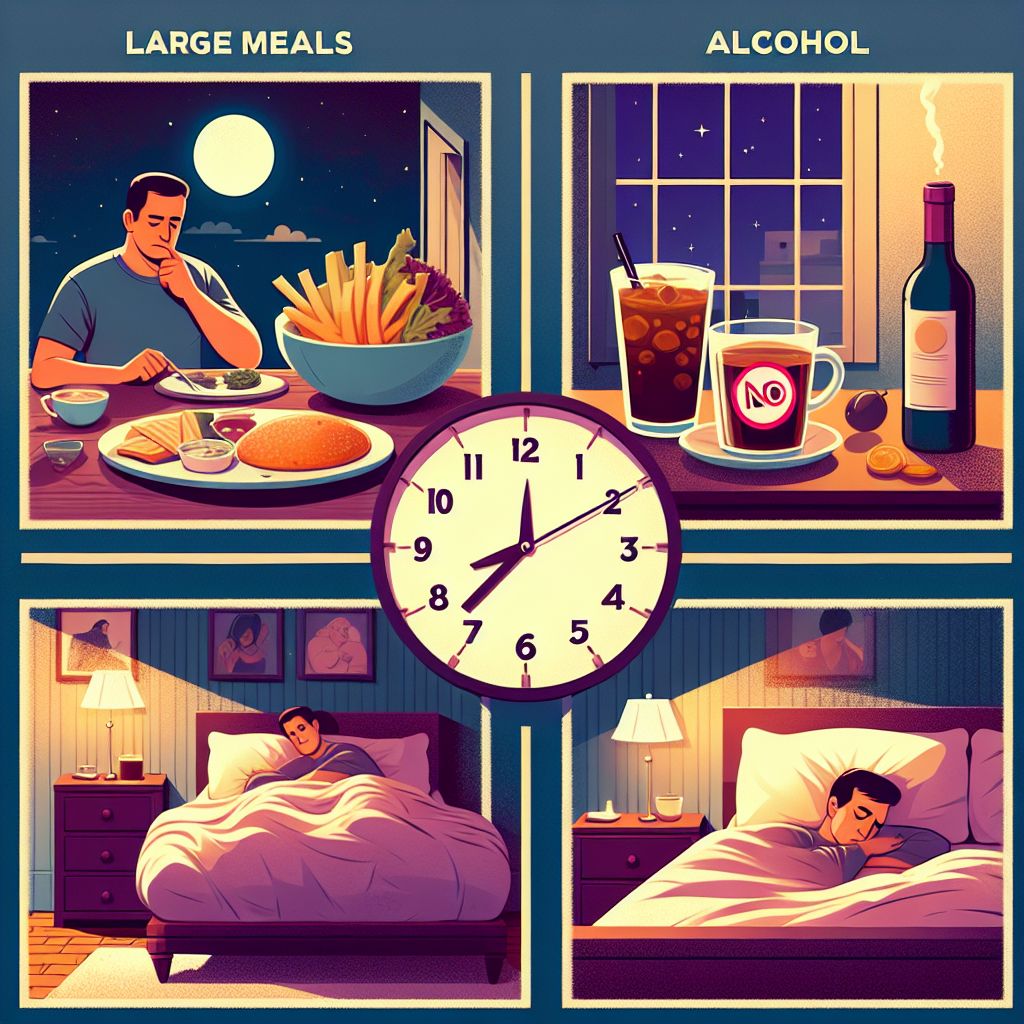Key Takeaways
- Melatonin supplements can effectively regulate your sleep cycle, particularly if you struggle with falling asleep.
- Lavender oil is a natural remedy known for its calming effects, making it beneficial for reducing sleep anxiety.
- Valerian root is often used to help with insomnia and anxiety, offering a natural sedative effect.
- Chamomile tea, consumed before bed, can promote relaxation and improve sleep quality.
- Practicing progressive muscle relaxation (PMR) can significantly reduce anxiety and improve sleep.
Comparison table of melatonin, lavender oil, valerian, chamomile tea, and PMR
| Sleep Aid | Form | Mechanism | Effectiveness | Side Effects | Recommended Usage |
|---|---|---|---|---|---|
| Melatonin | Supplement (liquid or capsule) | Regulates sleep-wake cycle | Moderate to high[1][4] | Generally safe; may cause drowsiness | 2-10 mg, 1 hour before bedtime[4] |
| Lavender Oil | Essential oil, tea | Promotes relaxation, reduces anxiety | Moderate[1][3] | Generally safe; may interact with some medications | As aromatherapy or tea before bed[3] |
| Valerian | Tea, tincture, capsule, tablet | May increase GABA levels | Moderate[1][3] | Possible vivid dreams, headaches, stomach upset | 300-600 mg, 2 hours before bed[4] |
| Chamomile Tea | Tea | Contains apigenin, promotes relaxation | Moderate[1][4] | Generally safe | 1 cup, 45 minutes before bed[4] |
| Progressive Muscle Relaxation | Technique | Reduces physical tension | Moderate[2] | No known side effects | Practice during the day, then at night[2] |
This table provides a concise overview of these natural sleep aids, comparing their forms, mechanisms of action, effectiveness, potential side effects, and recommended usage. It’s important to note that individual responses to these sleep aids may vary, and it’s always advisable to consult with a healthcare professional before starting any new sleep regimen[1][2][3][4].
Citations:
[1] https://www.healthline.com/nutrition/teas-that-help-you-sleep
[2] https://www.medicalnewstoday.com/articles/home-remedies-for-insomnia
[3] https://health.clevelandclinic.org/tea-for-sleep
[4] https://pillow.app/article/natural-sleep-aids-to-help-you-wind-down
Understanding Sleep Anxiety and Insomnia
Sleep anxiety and insomnia are more common than you might think. Many people lie awake at night, unable to drift off because their minds are racing with worries. These sleep disturbances can become a vicious cycle, where anxiety leads to poor sleep, which in turn increases anxiety. Therefore, understanding these conditions is the first step toward finding effective solutions.
Sleep anxiety is essentially the fear or worry about not being able to sleep. This can manifest as a racing mind, increased heart rate, or even a sense of dread as bedtime approaches. Insomnia, on the other hand, is a condition where individuals find it difficult to fall asleep, stay asleep, or wake up too early and are unable to go back to sleep. Most importantly, both conditions can lead to significant daytime impairments.
Effective Natural Remedies for Sleep Anxiety
Now that we understand the problem, let’s explore some natural remedies that can help alleviate sleep anxiety and insomnia. These solutions focus on calming the mind and body, promoting relaxation, and establishing a healthy sleep routine.
Melatonin Supplements
Melatonin is a hormone naturally produced by the pineal gland in the brain. It plays a crucial role in regulating sleep-wake cycles. For those struggling with insomnia or sleep anxiety, melatonin supplements can be a game-changer. They help signal to your body that it’s time to sleep, making it easier to fall asleep and stay asleep.
When choosing a melatonin supplement, it’s important to start with a low dose, typically 0.5 to 1 milligram, about 30 minutes before bedtime. You can gradually increase the dose if needed, but it’s best to consult a healthcare provider to determine the appropriate amount for your specific needs.
Lavender Oil Benefits
Lavender oil is renowned for its calming and soothing properties. It can be used in various ways to help reduce sleep anxiety. You can add a few drops to your pillow, use it in a diffuser, or even apply it to your temples and wrists before bed.
Research has shown that lavender oil can improve sleep quality, increase sleep duration, and help you feel more refreshed upon waking. Its calming effects can ease anxiety and promote a more restful night’s sleep.
Incorporating Relaxation Techniques
Relaxation techniques are powerful tools for combating sleep anxiety and improving overall sleep quality. These techniques work by calming the mind and relaxing the body, making it easier to drift into a peaceful slumber. By incorporating these practices into your nightly routine, you can reduce stress and anxiety, paving the way for a better night’s sleep.
There are several relaxation techniques to choose from, each with its own unique benefits. The key is to find the ones that work best for you and make them a regular part of your bedtime routine. Most importantly, consistency is crucial, as these techniques often become more effective with regular practice.
Progressive Muscle Relaxation (PMR)
Progressive Muscle Relaxation (PMR) is another effective technique for reducing sleep anxiety. It involves tensing and then relaxing different muscle groups in the body, which can help release physical tension and promote relaxation. PMR is particularly helpful for those who carry stress in their bodies, as it encourages the release of built-up tension.
To practice PMR, find a comfortable position, either sitting or lying down. Starting with your toes, tense the muscles in your feet for a few seconds, then release. Move up to your calves, thighs, and so on, working your way up the body. As you tense each muscle group, breathe in deeply, and as you release, exhale slowly. This practice can take around 10-15 minutes and can be a calming way to wind down before sleep.
Deep Breathing Exercises
Deep breathing exercises are simple yet effective tools for calming the mind and body. They help slow down your heart rate and reduce anxiety, making it easier to fall asleep. By focusing on your breath, you can create a sense of calm and relaxation, which is essential for a good night’s sleep.
One popular deep breathing exercise is the 4-7-8 technique. To begin, inhale quietly through your nose for a count of four. Hold your breath for a count of seven. Then, exhale completely through your mouth for a count of eight. Repeat this cycle three to four times. This technique can be practiced anytime you feel anxious, but it’s especially helpful right before bed to promote relaxation.
Lifestyle Changes to Improve Sleep Quality
In addition to relaxation techniques, certain lifestyle changes can significantly impact your sleep quality. By making small adjustments to your daily routine, you can create a more conducive environment for sleep and improve your overall well-being. Let’s explore some of these changes, such as understanding the biorhythm sleep cycle relationship.
Establish a Sleep Routine
Creating a consistent sleep routine is one of the most effective ways to improve sleep quality. By going to bed and waking up at the same time every day, even on weekends, you can regulate your body’s internal clock and make it easier to fall asleep and wake up naturally. This consistency helps your body know when it’s time to wind down and when it’s time to wake up.
Start by setting a bedtime that allows for 7-9 hours of sleep each night. Gradually adjust your schedule if needed, moving your bedtime earlier or later by 15 minutes every few nights until you reach your desired sleep schedule. Stick to this routine as closely as possible, even on weekends, to maintain a regular sleep pattern.
Besides that, establish a relaxing pre-sleep routine to signal to your body that it’s time to wind down. This could include activities such as reading a book, taking a warm bath, or practicing relaxation techniques like those mentioned earlier. The key is to create a calming environment that helps you transition from the busyness of the day to a restful night.
Impact of Diet on Sleep
Your diet can also play a significant role in your sleep quality. Certain foods and drinks can either promote sleep or hinder it, so it’s important to be mindful of your intake, especially in the hours leading up to bedtime. Avoiding caffeine and nicotine, which are stimulants, is crucial for a good night’s sleep. Additionally, be cautious with alcohol, as it can disrupt sleep patterns.
On the other hand, some foods can promote relaxation and improve sleep. Foods rich in tryptophan, such as turkey, chicken, and nuts, can increase the production of serotonin and melatonin, hormones that regulate sleep. Magnesium-rich foods like leafy greens, seeds, and whole grains can also help relax muscles and calm the nervous system. Consider incorporating these foods into your evening meals to support better sleep. For more information on natural ways to enhance sleep, check out this guide on natural sleep aids.
Exercise and Sleep Connection
Exercise is another lifestyle factor that can greatly impact sleep quality. Regular physical activity can help you fall asleep faster and enjoy deeper sleep. It reduces stress and anxiety, making it easier to relax at bedtime. However, it’s important to time your workouts appropriately, as exercising too close to bedtime can have the opposite effect and make it harder to fall asleep.
Aim to complete your workout at least 3-4 hours before bedtime to allow your body time to wind down. Morning or early afternoon workouts are ideal, as they can help regulate your body’s internal clock and promote alertness during the day and relaxation at night. Find an activity you enjoy, whether it’s walking, cycling, or yoga, and make it a regular part of your routine to reap the sleep benefits.

Implementing Good Sleep Hygiene
Good sleep hygiene involves creating an environment and daily routine that supports healthy sleep patterns. By making small changes to your surroundings and habits, you can improve your sleep quality and reduce sleep anxiety. Here are some tips to get you started.
First, create a sleep-friendly environment by keeping your bedroom cool, dark, and quiet. Consider using blackout curtains, earplugs, or a white noise machine to minimize disruptions. Invest in a comfortable mattress and pillows that support your preferred sleep position.
Limiting screen time before bed is also essential for good sleep hygiene. The blue light emitted by phones, tablets, and computers can interfere with the production of melatonin, making it harder to fall asleep. Aim to turn off electronic devices at least an hour before bedtime and engage in relaxing activities instead.
Finally, avoid large meals, caffeine, and alcohol close to bedtime, as they can disrupt sleep. Instead, opt for a light snack if you’re hungry, and stick to calming beverages like herbal tea. By implementing these sleep hygiene practices, you can create a more restful environment and improve your sleep quality.

Importance of a Sleep-Friendly Environment
Creating a sleep-friendly environment is essential for improving sleep quality and reducing anxiety. Your bedroom should be a sanctuary for rest, free from distractions and conducive to relaxation. Start by ensuring your room is cool, dark, and quiet. The ideal temperature for sleep is between 60-67 degrees Fahrenheit. Use blackout curtains to block out light and consider a white noise machine or earplugs to drown out disruptive sounds.
Investing in a comfortable mattress and pillows can also make a significant difference. Choose bedding that supports your preferred sleep position and provides the right balance of comfort and support. A comfortable sleep environment can help you fall asleep faster and stay asleep longer.
Limiting Screen Time Before Bed
Limiting screen time before bed is crucial for promoting better sleep. The blue light emitted by electronic devices such as phones, tablets, and computers can interfere with the production of melatonin, a hormone that regulates sleep. This can make it harder to fall asleep and lead to poorer sleep quality.
For example, a study published in the Journal of Clinical Sleep Medicine found that individuals who used electronic devices before bed took longer to fall asleep and experienced less restorative sleep.
To minimize the impact of screen time, aim to turn off electronic devices at least an hour before bedtime. Instead, engage in relaxing activities such as reading a book, listening to calming music, or practicing a relaxation technique. This will help signal to your body that it’s time to wind down and prepare for sleep.
When to Seek Professional Help
While natural remedies and lifestyle changes can be effective for many, there are times when professional help may be necessary. If sleep anxiety and insomnia persist despite trying these strategies, it may be time to consult a healthcare professional. They can help identify any underlying conditions that may be contributing to your sleep issues and recommend appropriate treatments.
Most importantly, don’t hesitate to seek help if your sleep problems are affecting your daily life. Chronic sleep deprivation can have serious consequences on your physical and mental health, so it’s important to address these issues promptly.
Signs You Need Medical Advice
There are several signs that may indicate the need for medical advice. If you experience any of the following, consider reaching out to a healthcare provider:
- Consistent difficulty falling or staying asleep despite trying natural remedies
- Excessive daytime sleepiness that interferes with daily activities
- Persistent feelings of anxiety or depression related to sleep
- Frequent waking during the night with difficulty returning to sleep
- Snoring or gasping for air during sleep, which could indicate sleep apnea
Options for Therapy and Counseling
- Cognitive Behavioral Therapy for Insomnia (CBT-I): A structured program that helps individuals identify and change thoughts and behaviors that contribute to sleep problems.
- Sleep Studies: Overnight monitoring that can help diagnose sleep disorders such as sleep apnea.
- Medication: In some cases, a healthcare provider may prescribe medication to help manage sleep disorders.
- Support Groups: Connecting with others who experience similar sleep issues can provide support and coping strategies.
By seeking professional help, you can gain a better understanding of your sleep issues and receive guidance on the most effective treatment options for your situation.
Alternatives
To further assist you in your journey to better sleep, here are some alternative ideas.
Consider CBD for insomnia
For insights on how to use CBD for insomnia relief, explore the benefits and uses of this natural remedy.
Do sleep patches work for insomnia?
Here’s a comparison of sleep patches that have been effective for some (including me).
Can exercise influence sleep quality?
Exercise can greatly influence sleep quality by reducing stress and anxiety, helping you fall asleep faster, and promoting deeper sleep. It’s important to time your workouts appropriately, ideally completing them at least 3-4 hours before bedtime to allow your body to wind down.
Can dietary changes really impact sleep patterns?
Yes, dietary changes can impact sleep patterns. Consuming foods rich in tryptophan and magnesium, such as turkey, chicken, nuts, leafy greens, and whole grains, can promote relaxation and improve sleep quality. Conversely, avoiding caffeine, nicotine, and large meals close to bedtime can help prevent sleep disruptions.

